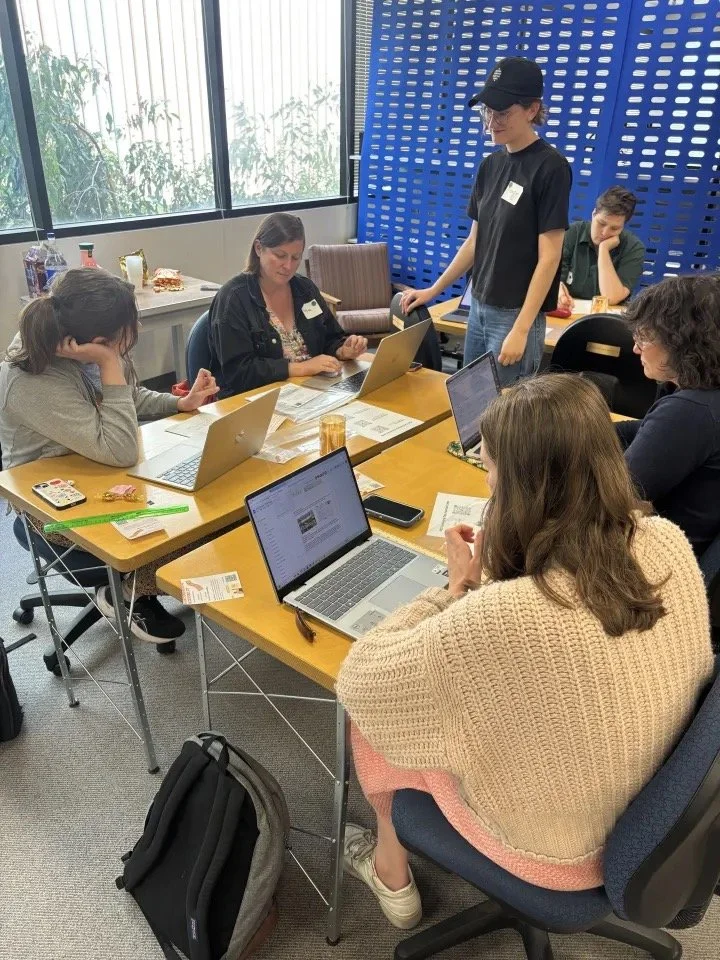PSD’s first Community Cataloging Day










On April 15th, 2025 we hosted our first Community Cataloging Day at UCLA’s Information Studies (IS) Library and Media Preservation Lab. You might be asking “What is cataloging?” and “Why would PSD host an event like this?”. Cataloging, according to the Society of American Archivists, is “the act of creating a concise description of an archival or library resource, especially one that adheres to a descriptive standard with the intention of adding the description to a compilation of such descriptions”. PSD started as an idea in December 2022 and has developed into a community archive – which grows on a weekly basis. In pursuit of being responsible stewards of the archive, we formed an Archival Advisory Group. While we have many goals, including digitizing our backlog of letters and postcards, our first goal was to establish a robust and thoughtful metadata schema. Metadata is “information about data that promotes discovery, structures data objects, and supports the administration and preservation of records” (SAA). Our dream is to eventually (with lots of patience and steadiness) create a web-based platform where users can search the archive and discover letters that help them navigate their own grief journey. Please see below for more details about our outstanding Archival Advisory Group.
Now back to the Cataloging Day event! We began the event with an orientation which included background on the project, introductions from our Archival Advisory Group, and we walked through our processing document. For eight months, from October 2024 to April 2025, we worked on developing an 18-page processing document that included traditional terms such as “object location” and custom terms such as “context of death” – these terms and the standards outline how information should be captured and acts as a manual for archivisits. While this may seem a bit over the top, standards are necessary to make sure we have “clean data” that can help materials be searchable and user friendly in the future.
Throughout the event, we emphasized our desire to hear, learn, and improve our process through student’s input. Additionally, we discussed the potential emotional heaviness of processing sensitive materials. As a group, we brainstormed tools and techniques archivists can use for self-care. Participants suggested taking walks for fresh air while processing and also considering after-care by listening to a favorite album. Another tool we implemented, which aimed to provide a helpful boundary with the materials, was to open and close the space with a simple guided visualization and use LED candles as a visual symbol. When we turned on the candles, we created a space that accepts all expressions of grief and honors the dead. Turning off the candles was a visual cue that our hard work, both technical in processing and also emotional in honoring, could come to a close.
Throughout the 3 hour program, 8 participants helped us catalog metadata for 35 items. We were upfront with participants that the event was intended to be a learning experience for everyone – for students to get hands-on archiving experience and for PSD to see our processing document in action. We collected feedback throughout the event, answered questions to clarify processes and schema terms, then collected final thoughts through a survey at the end of the event. For example, one participant shared the idea to capture postage stamp details which can be a political and personal choice in the letter writing experience. I think everyone has had an experience like this; one in which something so obvious, such as a postage term for a letter writing archive, somehow gets forgotten in a mess of details. This is why collaborating with community is so important – it allows many voices to be heard, enriches every step of the process, and creates something more meaningful than you can imagine in isolation. In that spirit, we would like to thank all the students who attended the event as well as Casey Winkleman (Librarian/Manager) and Emily Benoff (Research And Administrative Assistant) at UCLA for enthusiastically supporting this event.
The Archival Advisory Group is currently taking a break after many months of dedicated and focused work. We are looking forward to returning to our cataloging document and refining our processes. Please sign up for our newsletter if you are interested in learning about future cataloging events or email us if you would like to learn more or volunteer!
Postal Service for the Dead’s Archival Advisory Group
Danielle Galván Gomez (she/her) is an Information Professional, Artist, and Cultural Worker who is currently the Civic Art Registrar for the Los Angeles County Department of Arts and Culture. Danielle has a Masters in Library and Information Science (MLIS) from the University of Washington Information School and received the prestigious Spectrum Scholar from American Library Association
Isabella León-Chambers (she/her) is an archivist and memory worker of multiracial descent based in Los Angeles. She earned her MLIS from UCLA and graduated summa cum laude from New York University.
Sydney Kysar (they/she): Los Angeles born-and-raised, Sydney has helped refurbish over a hundred elementary school libraries in the LA-area: painting murals and building library collections.While interviewing librarians for mural concepts, Sydney was introduced to library science and graduated with a Masters in Library and Information Science from UCLA in March 2025 with a focus on archival work centered on community collaboration.
Janelle Ketcher (she/her) is an artist, library science professional, and Founder of Postal Service for the Dead. She is originally from Iowa and currently lives and works in Los Angeles. Janelle holds a BFA in Painting, Art History and Social Practice from The Kansas City Art Institute; received the Certification in Social Emotional Arts from Arts & Healing Initiative, completed the End of Life Training Program at Going with Grace, and is pursuing a MS in Library and Information Science at the University of Illinois Urbana-Champaign. Her focus is to encourage creative expression throughout our entire lifespan-from youth programming to end of life projects through the intersections of resource access, archiving, and public service.
